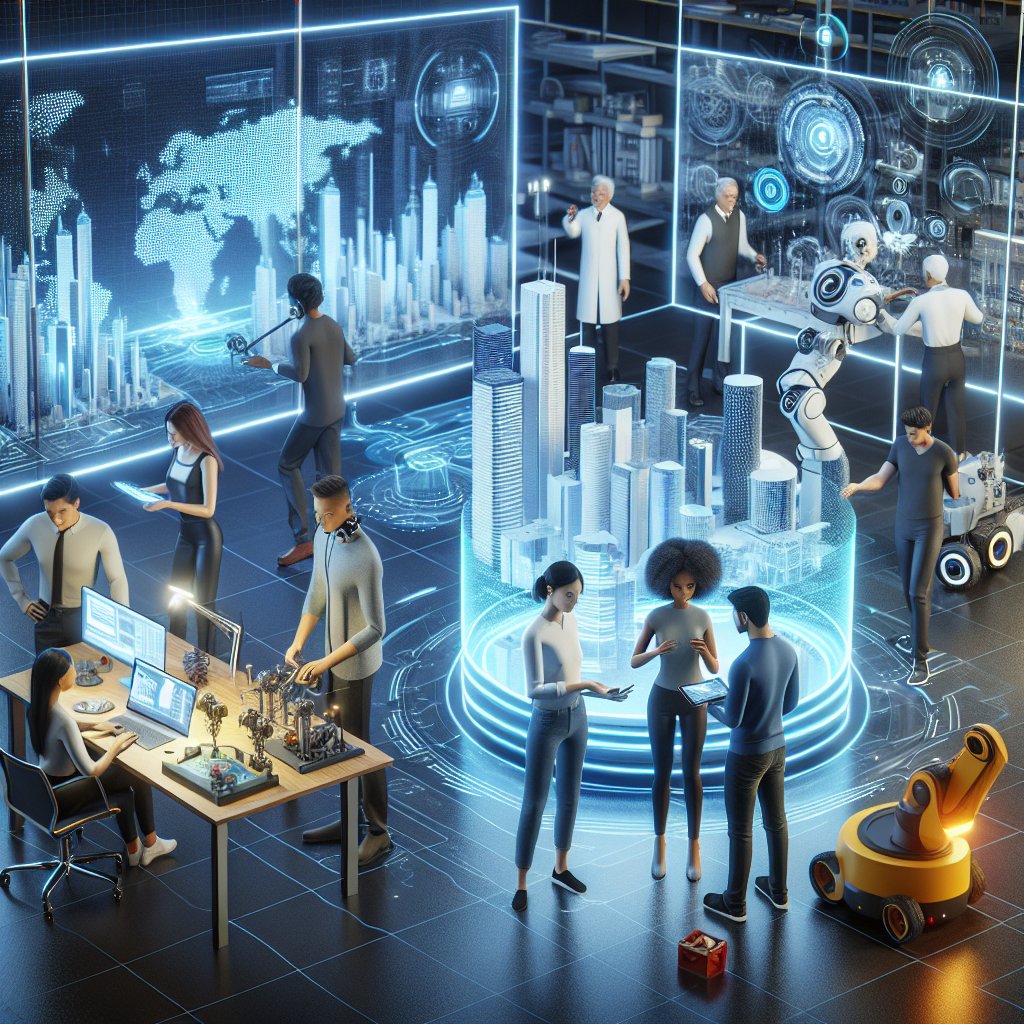The integration of AI in engineering fields is streamlining complex problem-solving, optimizing design processes, and boosting innovation, leading to an enhanced synergy between human ingenuity and machine precision. However, rather than replacing engineers, AI is poised to augment their capabilities, allowing them to tackle more significant challenges and drive forward an era of unparalleled technological advancement.
Use of AI for Engineers
The integration of artificial intelligence (AI) in engineering is revolutionizing the way engineers approach design, diagnostics, and problem-solving in various sectors. AI-powered tools are streamlining complex computational tasks, enabling engineers to simulate and analyze multiple scenarios swiftly, and with a higher degree of accuracy. This technological evolution equips engineers with capabilities such as predictive maintenance, optimized design processes, and advanced robotics, all of which are reshaping the landscape of engineering. AI is particularly influential in fields like civil, mechanical, and electrical engineering, where it assists in creating smarter infrastructure, enhancing manufacturing processes, and developing innovative solutions to longstanding challenges.
Engineers are leveraging AI to push the boundaries of innovation, harnessing machine learning algorithms and data analytics to improve project outcomes and efficiency. In the construction industry, AI-driven systems are aiding in precise resource allocation, minimizing waste, and ensuring safety standards. Similarly, in the realm of electrical engineering, smart grids powered by AI optimize energy distribution and promote sustainable practices. As engineering disciplines become more intertwined with AI, professionals in this field are increasingly required to adapt to emerging technologies, ensuring they remain at the forefront of their industry’s evolution and maintain a competitive edge in an increasingly automated world.
The Potential for AI to Replace Engineers
The burgeoning field of artificial intelligence (AI) has permeated countless aspects of modern life, ranging from healthcare to transportation. Its reach has also extended into the domain of engineering, a realm ripe with complex problem-solving and design tasks that require a high level of precision and intellectual prowess. The potential for AI to replace engineers has become a topic of intense discussion, catalyzed by AI’s advancements in data analysis, automation, and machine learning. These innovations are transforming traditional engineering roles, leading to the automation of routine tasks and the augmentation of complex problem-solving capabilities, potentially reshaping the engineering profession as we know it.
How AI Enhances Engineering Creativity and Problem-Solving
Artificial Intelligence (AI) stands at the forefront of revolutionizing the engineering world by exponentially enhancing creativity and problem-solving. Engineers are tapping into AI’s powerful algorithms to simulate complex designs and visualize the repercussions of design decisions before they come to life. This preemptive approach, facilitated by AI’s predictive models, has led to a surge in innovative solutions and creative engineering feats. Moreover, AI’s capability to handle vast datasets has equipped engineers with unprecedented insights into materials, structures, and systems, fostering an environment where creativity is bolstered by data-driven decisions. This symbiosis of human ingenuity and machine learning is fast-tracking the development of groundbreaking projects that were once penned as speculative sketches into tangible realities.
As AI continues to evolve, its role in enhancing engineering workflows and ideation processes becomes more intrinsic. It provides a digital sandbox where engineers can experiment with multiple scenarios and prototypes, drastically reducing the time and costs associated with traditional trial-and-error methods. By employing advanced optimization techniques, AI can refine designs to achieve optimal performance, sustainability, or cost-efficiency, which pushes the boundaries of what’s possible in engineering. The creative potential of engineers is being amplified by AI’s meticulous and swift analysis, allowing them to forge solutions that not only meet but exceed the demands of modern challenges, thereby shaping the future of engineering with intelligent innovation.
The Evolving Educational Landscape for Engineers in an AI-Dominant Future
The engineering world is on the cusp of a renaissance as Artificial Intelligence (AI) begins to weave its way into the very fabric of the educational landscape for budding and established engineers alike. AI’s ever-expanding capabilities are not only revolutionizing the tools and systems engineers work with but are also reshaping the educational methods through which engineering knowledge is imparted. Traditional theory-heavy courses are morphing into dynamic, interactive learning experiences, where AI-driven simulations and virtual laboratories allow students to explore and innovate in a risk-free environment. This transformative era beckons a curriculum that is constantly updated to include AI methodologies, fostering a new generation of engineers equipped with a hybrid skill set of core engineering principles and cutting-edge AI expertise.
As engineers navigate through this AI-integrated educational journey, the emphasis on continuous learning and adaptability couldn’t be higher. Skills once thought of as ancillary, such as data analytics, machine learning, and AI ethics, are becoming fundamental components of the engineering syllabi. Institutions are restructuring their courses to create a synergy between AI advancements and engineering fundamentals, thus ensuring that graduates are proficient in AI technologies and prepared for the collaborative and interdisciplinary nature of modern engineering challenges. The foreseeable future promises an era where an engineer’s education is an amalgamation of traditional engineering acumen and fluency in AI, positioning them at the forefront of innovation and technological breakthroughs.
Engineers’ Roles in Developing and Governing AI Systems
Engineers stand at the forefront of the artificial intelligence (AI) revolution, playing a critical role in both the development and governance of AI systems. Their expertise is pivotal in designing algorithms, building AI models, and ensuring that systems perform tasks as intended while maintaining efficiency and accuracy. Engineers’ involvement in AI development spans across multiple disciplines, including software, hardware, and data science which makes their contribution invaluable in crafting intelligent systems that effectively integrate with our daily lives. As technology advances, engineers are constantly presented with new challenges that require innovative solutions to enhance AI capabilities and push the boundaries of what machines can do.







